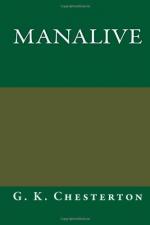“And at this, that giant from whom the light of reason was withheld threw out his mighty arms and asked me to forgive him. And when I asked him for what he should be forgiven he answered: `For being right.’
“`Your idols and emperors are so old and wise and satisfying,’ he cried, `it is a shame that they should be wrong. We are so vulgar and violent, we have done you so many iniquities— it is a shame we should be right after all.’
“And I, still enduring his harmlessness, asked him why he thought that he and his people were right.
“And he answered: `We are right because we are bound where men should be bound, and free where men should be free. We are right because we doubt and destroy laws and customs— but we do not doubt our own right to destroy them. For you live by customs, but we live by creeds. Behold me! In my country I am called Smip. My country is abandoned, my name is defiled, because I pursue around the world what really belongs to me. You are steadfast as the trees because you do not believe. I am as fickle as the tempest because I do believe. I do believe in my own house, which I shall find again. And at the last remaineth the green lantern and the red post.’
“I said to him: `At the last remaineth only wisdom.’
“But even as I said the word he uttered a horrible
shout,
and rushing forward disappeared among the trees.
I have not seen this man again nor any other man.
The virtues of the wise are of fine brass.
“Wong-Hi.”
“The next letter I have to read,” proceeded Arthur Inglewood, “will probably make clear the nature of our client’s curious but innocent experiment. It is dated from a mountain village in California, and runs as follows:—
“Sir,—A person answering to the rather extraordinary description required certainly went, some time ago, over the high pass of the Sierras on which I live and of which I am probably the sole stationary inhabitant. I keep a rudimentary tavern, rather ruder than a hut, on the very top of this specially steep and threatening pass. My name is Louis Hara, and the very name may puzzle you about my nationality. Well, it puzzles me a great deal. When one has been for fifteen years without society it is hard to have patriotism; and where there is not even a hamlet it is difficult to invent a nation. My father was an Irishman of the fiercest and most free-shooting of the old Californian kind. My mother was a Spaniard, proud of descent from the old Spanish families round San Francisco, yet accused for all that of some admixture of Red Indian blood. I was well educated and fond of music and books. But, like many other hybrids, I was too good or too bad for the world; and after attempting many things I was glad enough to get a sufficient though a lonely living in this little cabaret in the mountains. In my solitude I fell into many of the ways of a savage. Like




